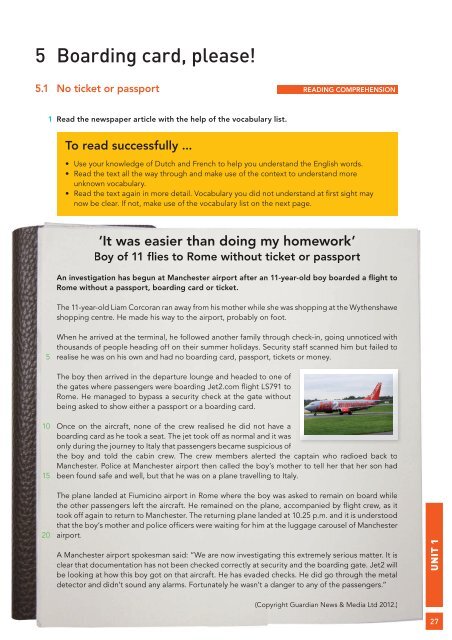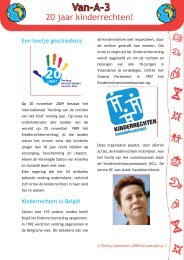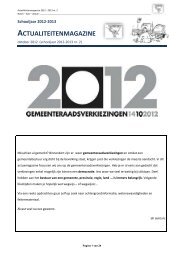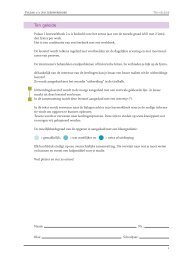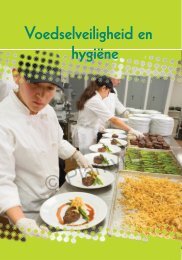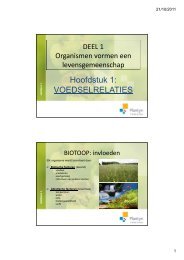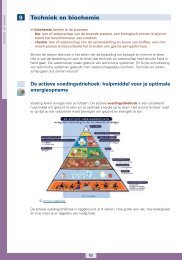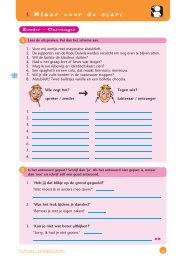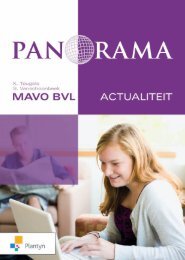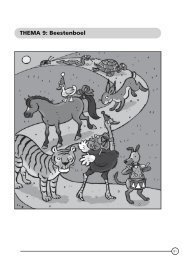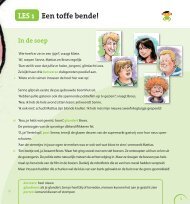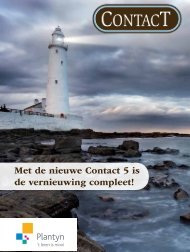01-New Contact 3-TIO-BoekjeUnit1.indd - Plantyn
01-New Contact 3-TIO-BoekjeUnit1.indd - Plantyn
01-New Contact 3-TIO-BoekjeUnit1.indd - Plantyn
You also want an ePaper? Increase the reach of your titles
YUMPU automatically turns print PDFs into web optimized ePapers that Google loves.
5 Boarding card, please!<br />
5.1 No ticket or passport<br />
1 Read the newspaper article with the help of the vocabulary list.<br />
5<br />
10<br />
15<br />
20<br />
To read successfully ...<br />
• Use your knowledge of Dutch and French to help you understand the English words.<br />
• Read the text all the way through and make use of the context to understand more<br />
unknown vocabulary.<br />
• Read the text again in more detail. Vocabulary you did not understand at rst sight may<br />
now be clear. If not, make use of the vocabulary list on the next page.<br />
‘It was easier than doing my homework’<br />
Boy of 11 ies to Rome without ticket or passport<br />
An investigation has begun at Manchester airport after an 11-year-old boy boarded a ight to<br />
Rome without a passport, boarding card or ticket.<br />
The 11-year-old Liam Corcoran ran away from his mother while she was shopping at the Wythenshawe<br />
shopping centre. He made his way to the airport, probably on foot.<br />
When he arrived at the terminal, he followed another family through check-in, going unnoticed with<br />
thousands of people heading off on their summer holidays. Security staff scanned him but failed to<br />
realise he was on his own and had no boarding card, passport, tickets or money.<br />
The boy then arrived in the departure lounge and headed to one of<br />
the gates where passengers were boarding Jet2.com ight LS791 to<br />
Rome. He managed to bypass a security check at the gate without<br />
being asked to show either a passport or a boarding card.<br />
READING COMPREHENSION<br />
Once on the aircraft, none of the crew realised he did not have a<br />
boarding card as he took a seat. The jet took off as normal and it was<br />
only during the journey to Italy that passengers became suspicious of<br />
the boy and told the cabin crew. The crew members alerted the captain who radioed back to<br />
Manchester. Manchester. Police at Manchester airport then then called the the boy’s boy’s mother to tell her that her son son had<br />
been found safe and well, well, but that he was was on a plane travelling travelling to to Italy.<br />
The plane landed landed at Fiumicino airport airport in Rome where the boy was asked to remain on board while while<br />
the other passengers left the aircraft. He He remained on the plane, accompanied accompanied by ight crew, as as it<br />
took took off again to return to Manchester. Manchester. The returning plane plane landed at 10.25 p.m. and it is understood<br />
that the boy’s mother and police of of cers were waiting for him at the luggage luggage carousel of Manchester<br />
airport.<br />
A Manchester airport spokesman said: “We are now investigating investigating this extremely serious serious matter. matter. It is<br />
clear that documentation has not been checked correctly at security and the boarding gate. Jet2 will<br />
be be looking at how this boy got got on that aircraft. He has evaded checks. He did go through the metal metal<br />
detector and didn’t sound any alarms. Fortunately he wasn’t a danger to any of the passengers.”<br />
(Copyright Guardian <strong>New</strong>s & Media Ltd 2<strong>01</strong>2.)<br />
UNIT 1<br />
27
UNIT 1 28<br />
Vocabulary<br />
to head off: to leave<br />
to bypass: omzeilen<br />
to take off: opstijgen<br />
suspicious: argwanend<br />
2 Now answer the questions.<br />
1 What was Liam doing before he went to Manchester airport?<br />
2 What trick did he use to get through security?<br />
to remain: to stay<br />
a spokesman: een woordvoerder<br />
to evade: ontglippen<br />
3 Which documents are you supposed to have with you when you travel to another country by<br />
plane?<br />
4 When did people start realising that something was wrong?<br />
5 Scan the article for two synonyms for “plane”.
5.2 At the airport<br />
These are some places Liam passed through at the airport. Write the appropriate words<br />
under the photographs. Reread the article if necessary. To help you, the number of letters<br />
is given.<br />
_ _ _ _ _ _ _ _ _ _ _ _ _ – _ _<br />
VOCABULARY PRACTICE<br />
_ _ _ _ _ _ _ _ _ _ _ _ _ _ _ _ _ _ _ _ _ _ _ _ _ _ _ _<br />
_ _ _ _ _ _ _ _ _ _ _ _ _ _ _ _ _ _ _ _ _ _ _ _ _ _ _<br />
UNIT 1<br />
29
UNIT 1<br />
30<br />
6 James and Claudia<br />
6.1 The present simple tense<br />
1 This is James. Write sentences about him in the 3 rd person singular.<br />
James is<br />
He<br />
I am sixteen years old.<br />
I’ve got two brothers.<br />
I can speak English, French and Dutch.<br />
I go to the swimming pool twice a week.<br />
I like camping and mountain climbing.<br />
I hate getting up early.<br />
I’m not afraid of the dark.<br />
I don’t eat vegetarian food.<br />
I never read books.<br />
2 This is Claudia. Also write sentences about her in the 3rd 2 This is Claudia. Also write sentences about her in the 3 person singular.<br />
rd person singular.<br />
Claudia<br />
She<br />
I am fifteen.<br />
I’m fond of visiting museums.<br />
I come from Italy.<br />
I do volunteer work.<br />
I watch crime series on TV.<br />
I like relaxing and shopping.<br />
I cry every time I watch a romantic film.<br />
I don’t like hamburgers.<br />
I always enjoy going to the beach.<br />
GRAMMAR REVISION
3 Answer these questions with a name and short answers. Write in the right-hand column.<br />
Questions Answers<br />
1 Who likes shopping?<br />
2 Who can speak French?<br />
3 Who has two brothers?<br />
4 Who likes going to the beach?<br />
5 Who works as a volunteer?<br />
4 Ask questions to the answers given in the right-hand column.<br />
Questions Answers<br />
1 What Claudia ? Hamburgers.<br />
2 How often James ? Twice a week.<br />
3 What James ? Mountain biking.<br />
4 When Claudia ? Every time she watches a<br />
romantic film.<br />
5 What James ? He never reads books.<br />
5 Ask some inversion questions about James and Claudia and write them in the left-hand<br />
column. Write the (short) answers in the right-hand column.<br />
Inversion questions Answers<br />
1<br />
2<br />
3<br />
4<br />
5<br />
UNIT 1<br />
31
UNIT 1<br />
32<br />
6 Complete the sentences below. Then consult Grammar Survey n° 10.1.1.2 and complete the<br />
exercise.<br />
A present tense situates the action in the period (a more or less broad<br />
period including “now”).<br />
A present simple tense is used for<br />
Examples (optional):<br />
7 Fill in the correct verb in the present simple tense. Choose from this list.<br />
to ask<br />
to clean<br />
to end<br />
to go (2×)<br />
to like – not<br />
to love<br />
to make<br />
to rise<br />
to stay – not<br />
When the school term ... (1) in June, James<br />
always ... (2) his room. His room is cluttered<br />
with school books, folders and papers, and<br />
that ... (3) him very nervous. His parents never<br />
... (4) him to do any other chores.<br />
The first two weeks of July, he always ... (5) to<br />
France with his parents and brothers. They all<br />
... (6) an active holiday: they ... (7) in their<br />
beds till 10 a.m., but they ... (8) early. James ...<br />
(9) his mountain bike for a ride and his<br />
brothers ... (10) for a run.<br />
In August, James normally ... (11) in a<br />
vegetarian restaurant. He ... (12) the dishes<br />
and ... (13) the kitchen. After working in this<br />
restaurant James always ... (14) a steak or<br />
hamburger. He ... (15) vegetables.<br />
(1)<br />
(2)<br />
(3)<br />
(4)<br />
(5)<br />
(6)<br />
(7)<br />
(8)<br />
(9)<br />
(10)<br />
(11)<br />
(12)<br />
(13)<br />
(14)<br />
(15)<br />
to take<br />
to tidy<br />
to want<br />
to wash<br />
to work
6.2 The present continuous tense<br />
1 Complete the sentences. Fill in the verb in the present continuous.<br />
Claudia usually does volunteer work, but today she (to work) in the supermarket.<br />
She always watches crime series. Right now she and her sister (to watch) CSI: Miami.<br />
In general, she doesn’t like hamburgers, but now she (to enjoy) a Big Mac.<br />
She likes relaxing, but at the moment she (to run) in the park.<br />
She always likes going to the beach, so today she (to sit – not) in her room with a book.<br />
2 Complete the sentences below. Then consult Grammar Survey n° 10.1.2.2 and complete the<br />
exercise.<br />
A present tense situates the action in the period.<br />
A present continuous tense is used for<br />
• an action that<br />
• an action in the present which is not<br />
permanent but<br />
• a situation that is<br />
or<br />
The present continuous can also be used to<br />
express<br />
6.3 The present simple or the present<br />
continuous tense?<br />
Examples (optional):<br />
On the Internet, you are looking for some information to go on a weekend trip. Suddenly you<br />
come across this extract from a travel blog about Paris. Read the extract and ll in the verbs<br />
in the correct present tense.<br />
My name is Boris and I ... (to write) (1) this travel<br />
blog from the romantic Hotel Aida in the centre<br />
of Paris. It ... (to be) (2) 8 o’clock in the morning.<br />
My girlfriend Svetlana and I ... (to sit) (3) on our<br />
balcony and we ... (to admire) (4) the beautiful<br />
view. The sun ... (to shine) (5), the birds ... (to sing)<br />
(6) a French tune and the people in the street ...<br />
(to wear) (7) their most expensive clothes.<br />
The owner of the hotel is called Monsieur Joseph,<br />
an old man with an enormous moustache. Every<br />
morning he ... (to leave) (8) at 6 a.m. to go to the<br />
baker’s. Half an hour later he is back and he ... (to<br />
start) (9) preparing breakfast. He always ... (to<br />
(1)<br />
(2)<br />
(3)<br />
(4)<br />
(5)<br />
(6)<br />
(7)<br />
(8)<br />
(9)<br />
GRAMMAR REVISION<br />
GRAMMAR REVISION<br />
UNIT 1<br />
33
UNIT 1 34<br />
34<br />
follow) (10) the same routine. He first ... (to make)<br />
(11) coffee. Then he ... (to open) (12) his bag,<br />
... (to take out) (13) croissants and ... (to lay) (14)<br />
some in a basket. Finally he ... (to cut up) (15) a<br />
few pieces of fresh bread and ... (to put) (16)<br />
them in the basket too. He also ... (to provide) (17)<br />
butter and jam.<br />
From our balcony we can see him now. He ... (to<br />
carry) (18) a tray with two cups of coffee, bread<br />
and some of the biggest croissants you’ve ever<br />
seen. Let’s hope these are for us. This is the<br />
perfect way to start another day in Paris!<br />
6.4 The ideal travelling companion<br />
1 You are planning a weekend trip and you want to take a friend with you. You have to choose<br />
between James and Claudia. Reread how they describe themselves on p. 30, and compare<br />
yourself with them. Use short additions.<br />
e.g. James likes mountain biking. So do I.<br />
Claudia does volunteer work. But I don’t.<br />
2 Who would be the most interesting travelling companion to take with<br />
you?<br />
Where would you like to go to on a weekend trip? What would you do<br />
there? Choose James or Claudia as your travelling companion for this<br />
weekend trip. Write him/her a text message to ask if he/she wants to<br />
go on this weekend trip with you. Also write why you want him/her to<br />
be your travelling companion.<br />
To write successfully ...<br />
• Have a clear idea of who you are writing this information for.<br />
• Remember the aim of your text: you want to invite someone for a trip.<br />
• Write a rst draft.<br />
• Structure your text.<br />
• Look up the correct words in an online or traditional dictionary.<br />
• Reread this message at least two times.<br />
(10)<br />
(11)<br />
(12)<br />
(13)<br />
(14)<br />
(15)<br />
(16)<br />
(17)<br />
(18)<br />
GRAMMAR REVISION<br />
WRITING PRACTICE<br />
Carrier
EXT 1.1 How to Survive Summer Camp<br />
1 Discuss the questions orally with a group of four or with the class.<br />
2 Read the information below.<br />
• Have you ever been on summer camp? If so, what<br />
sort of camp was it? (with a youth movement, to learn<br />
a foreign language, a sports camp, ...)<br />
• Have your parents ever forced you to go on summer<br />
camp? If so, looking back on it, did you like the camp?<br />
• Do you think you would ever send your children on a<br />
summer camp? Why (not)?<br />
• Think of some fun activities that are organised at<br />
summer camps.<br />
Being sent on summer camp by your parents ... This is what happens to<br />
Stella Stebbings in How to Survive Summer Camp, a novel written by<br />
Jacqueline Wilson, a popular English writer who has sold over 30 million<br />
copies of her books in the UK alone. Many of her books have been<br />
adapted for TV. She has also won numerous awards.<br />
This is how the story begins:<br />
Stella’s mother and stepfather have gone away on honeymoon and have<br />
left Stella at the Evergreen Adventure Holidays summer camp. Stella isn’t<br />
happy! Especially when she nds out she’s expected to swim - the one<br />
thing her mum promised she wouldn’t have to do. She’s determined not<br />
to enjoy herself and settles down for a nightmare summer!<br />
3 Read the extracts and answer the questions orally.<br />
5<br />
10<br />
15<br />
20<br />
I stood at the poolside in my borrowed swimming costume.<br />
It was an awful white puckered object with silly straps that<br />
tied at the back of the neck. I was scared the boys might try<br />
to undo them. But I was far more scared of the swimming<br />
pool. I’d thought it would be one of those turquoise<br />
rectangles, but it was worse. It was a real pool, like a big<br />
pond. The water was brown and bubbly and weed trailed<br />
all over the place in long green strands. ‘What are all them<br />
snakey things?’ Janie asked suspiciously. ‘We’re not going<br />
in there, are we? We don’t want snakey things nibbling our<br />
toes.’<br />
‘How can we have races in this squitty little pond? It’s just<br />
a kiddies’ paddling pool,’ said Louise, scornfully. ‘Yes, and<br />
it looks dirty to me,’ said Karen. ‘They could at least have a<br />
proper swimming pool with clean blue water. This place is a<br />
real dump.’<br />
‘Let’s not go in swimming then,’ I said quickly. ‘You’re right,<br />
Karen, it is dirty. Look at the colour. Maybe there aren’t any<br />
sewers at Evergreen. I think they just empty all the loos into<br />
the pool.’<br />
EXTENSION<br />
ORAL & WRITING PRACTICE &<br />
READING COMPREHENSION<br />
puckered: met plooitjes<br />
a strap: een bandje<br />
a rectangle: een rechthoek<br />
a pond: een vijver<br />
weed: wier<br />
to nibble: knabbelen<br />
squitty: vies<br />
scornful: smalend<br />
a sewer: wer: een riool<br />
a loo: een toilet<br />
1 Describe the pool Stella and the others have to swim in.<br />
2 How does Stella explain why the water looks dirty? Why do you think she says that?<br />
1<br />
UNIT 1<br />
35
UNIT 1<br />
36<br />
Even though the water looks dirty, Stella is forced to go in for some swimming lessons by Uncle<br />
Ron, one of the summer camp leaders.<br />
And swimming isn’t the only activity Stella hates ...<br />
5<br />
10<br />
15<br />
20<br />
25<br />
Miss Hamer-Cotton collected our letters for posting and<br />
handed out activity sheets. ‘Fill them up carefully, girls,<br />
in your neatest writing. How are you feeling, Karen? You’ve<br />
got your colour back now. I think you’ll be fit for the hike.<br />
We’re meeting downstairs in the hall at half past two. Wear<br />
your comfiest shoes, it’s quite a walk to Hampton Hill.’<br />
‘Do we have to go, Miss?’ asked Janie. ‘I don’t like long walks.<br />
They’re boring. Me and my friend would sooner play here in<br />
the bedroom.’ Miss Hamer-Cotton smiled stupidly as if Janie<br />
was joking and didn’t even bother to answer her.<br />
I concentrated on my activity sheet. I didn’t want to do judo or<br />
climbing or five-a-side football or rounders or rambling or<br />
mime or music. I didn’t want to BMX bike or box. I didn’t want<br />
to play chess or computer games. I didn’t know what macramé<br />
was but I was sure I didn’t want to do it. I certainly didn’t want<br />
to swim. About all that was left was Art. I didn’t mind doing<br />
Art so I put Art again and again, morning and afternoon, on<br />
Monday, Tuesday, Wednesday, Thursday, and Friday.<br />
‘You can’t do that,’ said Marzipan. ‘It says so on the back of<br />
the paper, look. You have to do four different activities each<br />
day. And you’ve got to fit in two swimming sessions a week<br />
as well.’ ‘I’ll make out I haven’t read the back of the paper,’<br />
I said quickly. I felt a bit worried when I handed my activity<br />
sheet to Miss Hamer-Cotton but she was too busy getting<br />
us all organized for the hike to notice. She kept saying it<br />
was going to be such fun – but she didn’t actually go on<br />
the hike herself, I noticed. I bet she put her feet up all<br />
afternoon and watched the telly.<br />
a hike: een flinke wandeling<br />
five-a-side football:<br />
minivoetbal<br />
rounders: een soort<br />
baseball<br />
rambling: wandelen<br />
chess: schaken<br />
the telly: the television<br />
1 What are the rules for lling in the activity sheet?<br />
2 Janie and Marzipan are two of Stella’s roommates. After reading this extract, what can<br />
you say about their characters?<br />
Miss Hamer-Cotton explains to Stella that it’s not possible to put Art as the only activity, so she<br />
lls in the sheet for her. The rst activity Stella has to take part in is judo. She annoys the judo<br />
teacher so much that he sends her out. The next activity is macramé ...<br />
5<br />
10<br />
Jilly was in charge of macramé, and Jilly was silly. She wore<br />
a flowery smock and sandals and a lot of old grey string<br />
jewellery dangled down her big chest. Janie and Rosemary<br />
and some of the other little girls wanted to make string<br />
necklaces so Jilly got them started off. Marzipan wanted to<br />
make a weird string tassel thing to suspend potted plants<br />
in mid air. ‘What do you want to make that for?’<br />
I whispered. ‘It’ll look so daft.’ ‘No it won’t. It’s for my mum.<br />
She likes that sort of thing,’ said Marzipan, looking hurt.<br />
‘Would you like to try to make one too, Stella?’ asked Jilly.<br />
‘No thank you.’ ‘Well, do you want to make a necklace like<br />
the others?’ ‘Not really.’ Jilly folded her arms. ‘You’ve got to<br />
a smock: een los hemd<br />
string: gemaakt van touw<br />
a tassel: een kwast<br />
to suspend: ophangen<br />
daft: idioot
15<br />
20<br />
25<br />
30<br />
make something, Stella. How about a string purse? It could<br />
be a present for your mother.’<br />
I didn’t feel like making a present for Mum. It was all her fault I<br />
was stuck at this horrible summer camp. She’d said I’d enjoy it<br />
but I’d decided to hate every minute of it. Some of the others<br />
were feeling pretty fed up too. Evergreen wasn’t a patch on<br />
most summer camps. It was supposed to offer horse riding,<br />
but there was just one Shetland pony. There was only one<br />
computer too, and it was the cheapest sort so you could only<br />
play the most basic games. The swimmers were allowed to<br />
canoe in the stream, but it wasn’t really deep enough and the<br />
swimming pool wasn’t much more than a pond. But it still<br />
seemed like Loch Ness to me. I had a swimming session<br />
every single day! It was so unfair. I had more swimming<br />
sessions than anyone else in the whole camp. Miss Hamer-<br />
Cotton said it would help me learn to swim quickly and stop<br />
me being frightened of the water. I was sure she was just<br />
being horrible and punishing me. So I tried to get my own<br />
back by messing about at the pool and not doing what Uncle<br />
Ron said. He tried to be all matey at first but eventually he<br />
got so cross he made me lose a team point. And then<br />
another. Louise and Karen were livid.<br />
1 Why doesn’t Stella want to make any presents for her mum?<br />
2 In what way are other summer camps much better than Evergreen?<br />
3 How can campers be punished?<br />
4 Why do you think Karen and Louise are so angry?<br />
a purse: een portemonnee<br />
not to be a patch on: niet<br />
te vergelijken zijn met<br />
to get your own back:<br />
to take revenge<br />
matey: vertrouwelijk<br />
cross: kwaad<br />
livid: razend<br />
At the end of the story, Stella’s mother and stepfather come to pick her up. They ask her if she<br />
liked the camp. This is her answer:<br />
5<br />
10<br />
15<br />
‘I keep telling you, I didn’t have a good time. It was terrible.<br />
I was just pretending when I said goodbye. They were all<br />
hateful to me. That girl Karen, she made me give her my<br />
T-shirt. And she messed up all my things. She even stole my<br />
chocolate. They were all horrid to me and they teased me<br />
about my hair. They called me Baldy and they all laughed at<br />
me. It was awful. The whole camp was awful. And they<br />
made me go in the swimming pool, I told you they would.<br />
Every single day. It was a special punishment.’ ‘Why were<br />
you being punished?’ said Mum. ‘Oh they just kept picking<br />
on me,’ I said quickly. ‘And the food was disgusting, they<br />
half starved us.’ I decided the seven sausages for supper<br />
didn’t count. ‘So I take it you don’t want to go back next<br />
year after all?’ said Mum. ‘You must be joking,’ I declared.<br />
‘I only just managed to survive it this time.’<br />
(extract from How to survive Summer Camp by Jacqueline Wilson<br />
(OUP, 2<strong>01</strong>1), copyright © Jacqueline Wilson 1985,<br />
reprinted by permission of Oxford University Press)<br />
to pretend: doen alsof<br />
horrid: afschuwelijk<br />
to pick on someone:<br />
op iemand afgeven<br />
1 What was Stella’s nickname?<br />
2 Stella says she didn’t have a good time. But there might be a few hints that she did like<br />
the camp. Find them in the extract.<br />
UNIT 1<br />
37
UNIT 1<br />
38<br />
4 You are Stella Stebbings. When you arrive back home, you have to ll in the Evergreen<br />
Adventure Holidays review sheet. Reread the extracts if necessary and rate the different<br />
aspects of the camp. Do not forget to write down your comments as well.<br />
Your name:<br />
EVERGREEN ADVENTURE HOLIDAYS<br />
REVIEW SHEET<br />
Please rate all aspects 1 (very bad), 2 (bad), 3 (okay), 4 (good) or 5 (super).<br />
1 2 3 4 5<br />
facilities (sport fields, swimming pool, computers, etc.) ■ ■ ■ ■ ■<br />
activities ■ ■ ■ ■ ■<br />
personal attention ■ ■ ■ ■ ■<br />
staff ■ ■ ■ ■ ■<br />
food ■ ■ ■ ■ ■<br />
general atmosphere ■ ■ ■ ■ ■<br />
Please write why you rated the aspects as you did, and give specific details:<br />
■ I certify that these comments are my own words.
EXT 1.2 Tongue twisters<br />
1 Look at the following word pairs. They have different vowel sounds. Pronounce them after<br />
your teacher or the CD.<br />
bed – bad had – head sad – said guess – gas<br />
2 Listen to the CD. Tick the word you hear.<br />
1 man O O men<br />
2 gas O O guess<br />
3 Brad O O bread<br />
4 pan O O pen<br />
5 Alan O O Ellen<br />
6 flashy O O fleshy<br />
7 dad O O dead<br />
8 than O O then<br />
3 Work in pairs. Pupil A covers the right-hand column, pupil B the left-hand column. In turn, read<br />
the sentence. The other pupil lls in the missing word. All the words can be found in ex. 2.<br />
Pupil A Pupil B<br />
I would like a new pen for my birthday. I would like a new for my birthday.<br />
Of all the crew members, I like the<br />
best.<br />
Of all the crew members, I like the<br />
cameramen best.<br />
Your baby is cute, but isn’t he a bit fleshy? Your baby is cute, but isn’t he a bit ?<br />
That’s a very good . That’s a very good guess.<br />
I will see you tomorrow then! I will see you tomorrow .<br />
is my best friend. Alan is my best friend.<br />
I am very fond of bread. I am very fond of .<br />
You shouldn’t use the word “ ”<br />
in a business letter.<br />
4 Read these tongue twisters as fast as you can.<br />
You shouldn’t use the word “dad” in a<br />
business letter.<br />
Mary Mac’s mother’s making Mary Mac marry me. My mother’s making<br />
me marry Mary Mac. Will I always be so merry when Mary’s taking care of<br />
me? Will I always be so merry when I marry Mary Mac?<br />
How many cans can a cannibal nibble, if a cannibal can nibble cans?<br />
As many cans as a cannibal can nibble if a cannibal can nibble cans.<br />
PRONUNCIA<strong>TIO</strong>N<br />
UNIT 1<br />
39
UNIT 1 40<br />
FOCUS VOCABULARY UNIT 1<br />
HOLIDAYS<br />
Cover the second and the fourth columns and translate the English words into Dutch. Check.<br />
Then cover the rst and the third columns and translate the Dutch words into English.<br />
Check spelling and pronunciation.<br />
a cruise holiday een cruise a city trip een stedentrip<br />
an active holiday een doevakantie a camping holiday een kampeervakantie<br />
a beach holiday een strandvakantie a resort holiday een luxeverblijfvakantie<br />
a backpacking<br />
holiday<br />
THE WAY I SEE IT<br />
een rugzakvakantie a culture holiday een cultuurvakantie<br />
I would like ... Ik zou graag ... I wouldn’t mind ... Ik zou het niet erg<br />
vinden ...<br />
In my opinion, ... Naar mijn mening ... The way I see it, ... Zoals ik het zie, ...<br />
You’re absolutely<br />
right!<br />
I’m not sure about<br />
that.<br />
Je hebt volkomen<br />
gelijk!<br />
Ik weet het niet<br />
goed. / Daar ben ik<br />
niet zeker van.<br />
That’s exactly how I<br />
feel!<br />
I’m afraid I disagree<br />
(with you there).<br />
Ik denk er precies<br />
hetzelfde over!<br />
Ik ben bang dat ik<br />
het niet met je eens<br />
ben.<br />
I don’t think so. Ik dacht het niet. I totally disagree. Ik ben het helemaal<br />
niet met je eens.<br />
Is it okay if I say<br />
something?<br />
Is het goed als ik iets<br />
zeg?<br />
And if I might add<br />
something, ...<br />
Als ik daar iets aan<br />
mag toevoegen, ...
WANT SOMETHING DIFFERENT?<br />
Cover the middle column. Read out the sentences on the left, translating the Dutch words<br />
into English. Write the English words down on a sheet of paper and then check them against<br />
the list in the middle column. You can also use the middle and right-hand columns to study<br />
the vocabulary.<br />
Note: The stressed syllable is in bold.<br />
Some people are always looking for the<br />
... (vreemdste) ... ... (vakantieplekken) in the<br />
world.<br />
If they want a spooky ... (korte vakantie),<br />
they go to Romania to visit Dracula’s<br />
... (kasteel) and ... (graftombe).<br />
Some tourists look for ... (ruimtewezens) in<br />
the ... (woestijn) around Roswell.<br />
... (Avontuurlijke) people even consider<br />
a ... (uitstap) to Chernobyl, where in 1986<br />
a ... ... (kernramp) took place at the<br />
... ... (kerncentrale). The ... (verlaten) area is<br />
still ... (besmet), so you have to take some<br />
... (voorzorgen) against the high levels of<br />
... (straling).<br />
You can only visit North Korea as part of an<br />
... ... (georganiseerde rondreis) with a<br />
... (gids) who shows you around to see<br />
the ... (bezienswaardigheden).<br />
Travelling into ... (de ruimte) will soon be<br />
available for ... ... ... (Jan Modaal). You can<br />
leave from the ... (ruimteluchthaven) in<br />
<strong>New</strong> Mexico.<br />
oddest (odd)<br />
holiday locations<br />
(a holiday location)<br />
(a) break<br />
(a) castle<br />
(a) tomb<br />
aliens (an alien)<br />
(a) desert<br />
adventurous<br />
(a) trip<br />
(a) nuclear disaster<br />
(a) power plant<br />
abandoned<br />
contaminated<br />
precautions<br />
(a precaution)<br />
radiation<br />
(an) organised tour<br />
(a) guide<br />
sights (a sight)<br />
space<br />
the Average Joe<br />
(a) spaceport<br />
vreemd<br />
een vakantieplek<br />
een korte vakantie<br />
een kasteel<br />
een graftombe<br />
een ruimtewezen<br />
een woestijn<br />
avontuurlijk<br />
een uitstap<br />
een kernramp<br />
een kerncentrale<br />
verlaten<br />
besmet<br />
een voorzorgsmaatregel<br />
straling<br />
een georganiseerde<br />
rondreis<br />
een gids<br />
een bezienswaardigheid<br />
de ruimte<br />
Jan Modaal<br />
ruimteluchthaven<br />
UNIT 1<br />
41
UNIT 1<br />
42<br />
ALL ABOARD!<br />
a mobile phone een gsm an electronic device een elektronisch<br />
apparaat<br />
a seatbelt een veiligheidsriem a strap een band(je)<br />
an exit een uitgang a plane een vliegtuig<br />
cabin pressure de cabinedruk an oxygen mask een zuurstofmasker<br />
to adjust aanpassen a life vest een reddingsvest<br />
to inflate opblazen a flight een vlucht<br />
first class eerste klas business class business class /<br />
tweede klas<br />
economy class economy class /<br />
derde klas<br />
an infant een klein kind, een<br />
baby<br />
hand luggage handbagage a trolley een rolwagentje<br />
a tray table een opklapbaar<br />
tafeltje<br />
the cockpit de cockpit<br />
an aisle een gangpad an aisle seat een stoel aan het<br />
gangpad<br />
a middle seat een middelste stoel a window seat een stoel aan het<br />
raam<br />
an overhead bin een bagagevak<br />
boven de stoel<br />
a pilot een piloot<br />
a flight attendant een steward(ess)
BOARDING CARD, PLEASE<br />
Some time ago, a British boy ... (ging aan boord<br />
van) a flight to Rome without a ... (paspoort),<br />
... ... (instapkaart) or ticket.<br />
First he went to the ... (luchthaven) on foot.<br />
When he arrived at the ... (vertrekhal), he<br />
followed a family with children through<br />
...-... (het inchecken). ... ... (Veiligheidspersoneel)<br />
let him go through the ... ... (metaaldetector)<br />
without noticing anything suspicious about him.<br />
The boy then arrived in the ... ... (vertreklounge)<br />
and went to the ... (gate) where he boarded<br />
a ... (vliegtuig) to Rome.<br />
When the ... (vliegtuig) ... ... (opsteeg),<br />
the ... (passagiers) realised something was wrong.<br />
A couple of hours later the boy returned to<br />
Manchester airport. His mother and the police<br />
were waiting for him at the ... ... (bagageband).<br />
GRAMMAR<br />
Only study this vocabulary if your teacher wants you to.<br />
boarded (to board)<br />
(a) passport<br />
(a) boarding card<br />
(an) airport<br />
(a) terminal<br />
check-in<br />
security staff<br />
(a) metal detector<br />
(a) departure lounge<br />
(a) gate<br />
(a) jet<br />
(an) aircraft<br />
took off (to take off)<br />
passengers<br />
(a passenger)<br />
(a) luggage carousel<br />
aan boord gaan van<br />
een paspoort<br />
een instapkaart<br />
een luchthaven<br />
een vertrekhal<br />
het inchecken<br />
veiligheidspersoneel<br />
een metaaldetector<br />
een vertreklounge<br />
een gate<br />
een vliegtuig<br />
een vliegtuig<br />
opstijgen<br />
een passagier<br />
een bagageband<br />
a short addition een kort zinnetje stress klemtoon<br />
an ordinary verb een gewoon<br />
werkwoord<br />
EXTENSION UNIT 1 VOCABULARY<br />
For the extension, there is no vocabulary to be studied.<br />
an auxiliary verb een hulpwerkwoord<br />
UNIT 1<br />
43
UNIT 1<br />
44


